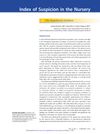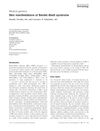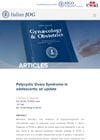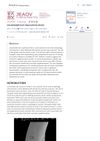 10 citations,
January 2019 in “The Nurse Practitioner”
10 citations,
January 2019 in “The Nurse Practitioner” PCOS is a common hormonal disorder in women, treated with lifestyle changes, medication, and patient education.
 March 2021 in “Serbian Journal of Experimental and Clinical Research”
March 2021 in “Serbian Journal of Experimental and Clinical Research” PCOS is a complex hormonal disorder with no clear cause or single diagnostic test, and current treatments focus on symptoms.
 February 2019 in “Neoreviews”
February 2019 in “Neoreviews” The infant with a urea cycle disorder improved with treatment and a liver transplant.
 4 citations,
October 2011 in “International Journal of Dermatology”
4 citations,
October 2011 in “International Journal of Dermatology” Bardet-Biedl syndrome may include under-recognized skin problems related to its metabolic disturbances.
60 citations,
June 1997 in “Baillière's clinical obstetrics and gynaecology” PCOS is often caused by hormonal imbalances that can lead to various health issues and may indicate a risk for future metabolic and cardiovascular problems.
 9 citations,
January 2015 in “Springer eBooks”
9 citations,
January 2015 in “Springer eBooks” The document concludes that managing PCOS involves treating symptoms, regulating periods, and reducing health risks, with specific medications for fertility and metabolic issues.
55 citations,
December 1987 in “Archives of Dermatology” Two enzyme defects in biotin metabolism cause severe skin, hair, and metabolic issues.
 32 citations,
June 2019 in “Frontiers in Endocrinology”
32 citations,
June 2019 in “Frontiers in Endocrinology” Polycystic Ovary Syndrome (PCOS) is common in women with conditions like anovulation, hirsutism, hair loss, and type 2 diabetes, and it can lead to health risks like heart disease, obesity, insulin resistance, and depression. Non-Classic Congenital Adrenal Hyperplasia (NC-CAH) is also discussed.
 26 citations,
June 2012 in “The Journal of Obstetrics and Gynecology of India”
26 citations,
June 2012 in “The Journal of Obstetrics and Gynecology of India” Most skin changes during pregnancy are harmless and temporary, but some can risk the fetus and need careful treatment.
 19 citations,
April 2018 in “International Journal of Dermatology”
19 citations,
April 2018 in “International Journal of Dermatology” People with Lichen Planopilaris are more likely to have autoimmune diseases, especially Systemic Lupus Erythematosus, and less likely to have diabetes and some other common conditions.
1 citations,
August 2021 in “Arhivʺ vnutrennej mediciny” Hormonal imbalances can cause hair loss, and understanding them can help develop better treatments.
 August 2018 in “Ayurlog: national journal of research in ayurveda science”
August 2018 in “Ayurlog: national journal of research in ayurveda science” Polycystic Ovarian Syndrome (PCOS) can be effectively treated with Ayurvedic dietary management.
 June 2020 in “Italian journal of gynaecology & obstetrics”
June 2020 in “Italian journal of gynaecology & obstetrics” The document concludes that PCOS in teenagers is hard to diagnose, influenced by various factors, and should be managed with lifestyle changes and medication.
 January 2022 in “Springer eBooks”
January 2022 in “Springer eBooks” The book explains causes and treatments for common hair loss, its psychological effects, related health risks, and emphasizes early screening and lifestyle changes.
 9 citations,
October 2017 in “Translational pediatrics”
9 citations,
October 2017 in “Translational pediatrics” Pediatric endocrinologists should provide early fertility counseling and preservation options to young patients at risk of infertility.
 282 citations,
October 2006 in “The Journal of Clinical Endocrinology and Metabolism”
282 citations,
October 2006 in “The Journal of Clinical Endocrinology and Metabolism” The Endocrine Society advised against routine testosterone therapy for women, citing a need for more research on long-term safety and a clear definition of androgen deficiency.
 February 2023 in “JEADV Clinical Practice”
February 2023 in “JEADV Clinical Practice” Biotin supplements significantly improved a young girl's uncombable hair.
 April 2022 in “International Journal of Health Sciences (IJHS)”
April 2022 in “International Journal of Health Sciences (IJHS)” A holistic treatment approach, including yoga, diet, exercise, and mindfulness, can effectively manage PCOS symptoms.
 April 2023 in “Journal of Cosmetic Dermatology”
April 2023 in “Journal of Cosmetic Dermatology” There's no strong link between Alopecia Areata, a hair loss condition, and fatty liver, but more research is needed.
 1744 citations,
August 2006 in “The Journal of Clinical Endocrinology and Metabolism”
1744 citations,
August 2006 in “The Journal of Clinical Endocrinology and Metabolism” Polycystic Ovary Syndrome should be seen mainly as a condition of excess male hormones, with a focus on this in its definition.
 12 citations,
October 2004 in “Expert Opinion on Investigational Drugs”
12 citations,
October 2004 in “Expert Opinion on Investigational Drugs” Treatments for Polycystic Ovary Syndrome (PCOS) focus on reducing symptoms, restoring regular periods, and helping with pregnancy. Common treatments include hormone suppressors, fertility drugs, and insulin-sensitising agents.

The conclusion is that a more comprehensive and precise approach is needed for diagnosing PCOS to address its broader health risks.
 43 citations,
October 2019 in “Pediatric Research”
43 citations,
October 2019 in “Pediatric Research” Lifestyle changes are the main treatment for PCOS, which is a complex condition requiring early management to reduce its health impacts.
 16 citations,
September 2018 in “Clinical Biochemistry”
16 citations,
September 2018 in “Clinical Biochemistry” The document concludes that more research is needed to fully understand the causes of PCOS.
 10 citations,
January 2014 in “Endocrinology & metabolic syndrome”
10 citations,
January 2014 in “Endocrinology & metabolic syndrome” PCOS is a long-term condition that needs more research for better understanding and treatment.
 1540 citations,
October 2008 in “Fertility and Sterility”
1540 citations,
October 2008 in “Fertility and Sterility” The report concludes that PCOS is mainly a condition of excess male hormones and its definition may change as new information is discovered.
 11 citations,
January 1985 in “Archives of Dermatology”
11 citations,
January 1985 in “Archives of Dermatology” Topical antiandrogens might treat skin issues like hair growth, balding, and acne, but finding effective treatments without side effects is challenging.
 April 2023 in “Journal of Investigative Dermatology”
April 2023 in “Journal of Investigative Dermatology” People with Alopecia Areata are more likely to have certain health issues like ulcerative colitis and type 1 diabetes, but less likely to have others like hypertension and type 2 diabetes.
 May 2022 in “Journal of Education, Health and Sport”
May 2022 in “Journal of Education, Health and Sport” Skin diseases like psoriasis, lupus, and others can increase heart disease risk due to factors like chronic inflammation and genetic susceptibility.
 251 citations,
October 2014 in “The Journal of Clinical Endocrinology & Metabolism”
251 citations,
October 2014 in “The Journal of Clinical Endocrinology & Metabolism” The guidelines advise against using testosterone and DHEA in women for most conditions due to safety and effectiveness concerns, but suggest considering testosterone for postmenopausal women with low sexual desire.



























